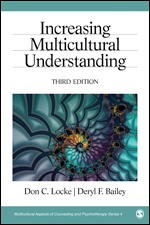Increasing Multicultural Understanding
Third Edition
Don Cary Locke - University of North Carolina, Asheville
Deryl F. Bailey - The University of Georgia, Department of Counselor Education
Don Cary Locke - University of North Carolina, Asheville
Deryl F. Bailey - The University of Georgia, Department of Counselor Education
352 pages
| September, 2013
| SAGE Publications, Inc
Instant Access!
eBook
ISBN: 9781483314211
Paperback
ISBN: 9781412936583
$85.00
Instant Access!
eBook
ISBN: 9781483314211
Increasing Multicultural Understanding, Third Edition provides the necessary tools to foster positive and productive relationships among culturally diverse populations. Authors Don C. Locke and Deryl F. Bailey encourage readers to explore their own cultural background and identity, and in the process, begin to better understand others. A best-seller in the first and second editions, this revised and expanded third edition continues to present its classic framework for critical observation with at least 10 elements, including: the history of oppression, religious practices, family structure, degree of acculturation, poverty, language and the arts, racism and prejudice, sociopolitical factors, child-rearing practices, and values and attitudes.
Available formats
ISBN: 9781483314211
eBook
Suggested Retail Price: $36.00
Bookstore Price: $28.80
ISBN: 9781483314211
eBook
Suggested Retail Price: $41.00
Bookstore Price: $32.80
ISBN: 9781483314211
eBook
Suggested Retail Price: $45.00
Bookstore Price: $36.00
ISBN: 9781483314211
eBook
Suggested Retail Price: $65.25
Bookstore Price: $52.20
ISBN: 9781412936583
Paperback
Suggested Retail Price: $85.00
Bookstore Price: $68.00
See what’s new to this edition by selecting the Features tab on this page. Should you need additional information or have questions regarding the HEOA information provided for this title, including what is new to this edition, please email sageheoa@sagepub.com. Please include your name, contact information, and the name of the title for which you would like more information. For information on the HEOA, please go to http://ed.gov/policy/highered/leg/hea08/index.html.
For assistance with your order: Please email us at textsales@sagepub.com or connect with your SAGE representative.
SAGE
2455 Teller Road
Thousand Oaks, CA 91320
www.sagepub.com
Acknowledgements
Introduction
Chapter 1: A Model of Multicultural Understanding
Chapter 2: Native American Indians
Chapter 3: Mexican Americans
Chapter 4: Puerto Rican Americans
Chapter 5: African Americans
Chapter 6: Chinese Americans
Chapter 7: Japanese Americans
Chapter 8: Korean Americans
Chapter 9: Vietnamese in the United States
Chapter 10: Jewishness in America
Chapter 11: Muslims in the United States
Chapter 12: Social Justice in Education and Counseling
Epilogue
Author Bios
NEW TO THIS EDITION:
- Features a new chapter on social justice.
- Includes thoughtfully updated chapters on specific groups: African Americans, Japanese Americans, Mexican Americans, Korean Americans, Native American Indians, Chinese Americans, and Vietnamese in the United States.
KEY FEATURES:
- Current affairs are woven throughout the chapters to encourage understanding of cultural competence.
- An invaluable model for both prospective and current counselors.
- Successfully crosses disciplines to a variety of other fields in which the demand to understand cultural membership is growing.

